Dec 05 2024 2 mins
Indiana is gearing up for significant changes and developments across various sectors as the year draws to a close.
A recent house fire in Wabash tragically claimed the life of a two-year-old and critically injured an infant, underscoring the need for enhanced public safety measures[1]. Meanwhile, the state is preparing to launch a new treatment for long COVID fatigue and memory loss, offering hope to those affected by the lingering impacts of the pandemic[1].
In government and politics, the Indiana legislature is set to prioritize infrastructure, housing, and tax reforms in the upcoming 2025 session[1]. The state has also seen notable policy changes, including the settlement between advocates, Indiana Michigan Power, and tech giants Amazon, Google, and Microsoft to protect ratepayers[1]. Additionally, President-elect Donald Trump has filled the remaining cabinet slots, which could have implications for Indiana's economic and environmental policies[2].
On the business front, Indiana has received nearly $40 million in federal grants for regional rail improvements, which is expected to boost the state's infrastructure and economic development[1]. The Indiana Chamber of Commerce has outlined six key priorities for lawmakers, focusing on workforce issues and child care[1].
Community news highlights the importance of after-school programs, which provide safe spaces for Hoosier kids to build skills during the winter months[1]. The USDA has also granted funds to stock Indiana food pantries, addressing food insecurity ahead of the holiday season[1]. However, concerns over housing agency failures have pushed Indy families toward homelessness, emphasizing the need for urgent action[1].
Environmental and weather updates include the increasing cases of walking pneumonia, prompting a health alert for Hoosiers[1]. The state's environmental advocates are facing uncertainties following the election, with potential shifts in federal leadership that could impact green goals[1]. The Indiana Department of Natural Resources is pushing a bobcat trapping plan, despite opposition from environmental groups[1].
Looking Ahead:
- The Indiana legislature's 2025 session is expected to tackle critical issues such as infrastructure, housing, and tax reforms.
- The impact of President-elect Donald Trump's cabinet picks on Indiana's economic and environmental policies will be closely watched.
- The state's environmental advocates will continue to navigate the uncertainties of federal leadership changes and their implications for green initiatives.
- The development of after-school programs and the addressing of housing agency failures will remain key community concerns in the coming months.
A recent house fire in Wabash tragically claimed the life of a two-year-old and critically injured an infant, underscoring the need for enhanced public safety measures[1]. Meanwhile, the state is preparing to launch a new treatment for long COVID fatigue and memory loss, offering hope to those affected by the lingering impacts of the pandemic[1].
In government and politics, the Indiana legislature is set to prioritize infrastructure, housing, and tax reforms in the upcoming 2025 session[1]. The state has also seen notable policy changes, including the settlement between advocates, Indiana Michigan Power, and tech giants Amazon, Google, and Microsoft to protect ratepayers[1]. Additionally, President-elect Donald Trump has filled the remaining cabinet slots, which could have implications for Indiana's economic and environmental policies[2].
On the business front, Indiana has received nearly $40 million in federal grants for regional rail improvements, which is expected to boost the state's infrastructure and economic development[1]. The Indiana Chamber of Commerce has outlined six key priorities for lawmakers, focusing on workforce issues and child care[1].
Community news highlights the importance of after-school programs, which provide safe spaces for Hoosier kids to build skills during the winter months[1]. The USDA has also granted funds to stock Indiana food pantries, addressing food insecurity ahead of the holiday season[1]. However, concerns over housing agency failures have pushed Indy families toward homelessness, emphasizing the need for urgent action[1].
Environmental and weather updates include the increasing cases of walking pneumonia, prompting a health alert for Hoosiers[1]. The state's environmental advocates are facing uncertainties following the election, with potential shifts in federal leadership that could impact green goals[1]. The Indiana Department of Natural Resources is pushing a bobcat trapping plan, despite opposition from environmental groups[1].
Looking Ahead:
- The Indiana legislature's 2025 session is expected to tackle critical issues such as infrastructure, housing, and tax reforms.
- The impact of President-elect Donald Trump's cabinet picks on Indiana's economic and environmental policies will be closely watched.
- The state's environmental advocates will continue to navigate the uncertainties of federal leadership changes and their implications for green initiatives.
- The development of after-school programs and the addressing of housing agency failures will remain key community concerns in the coming months.
